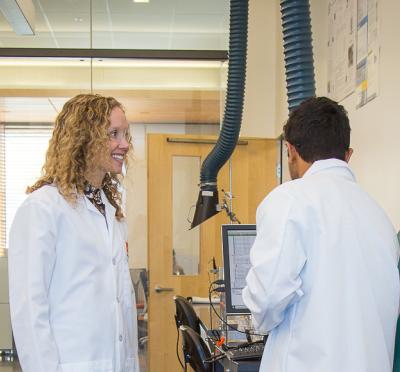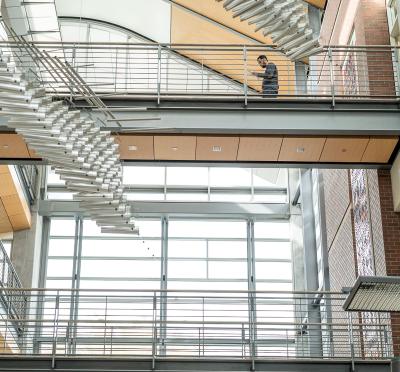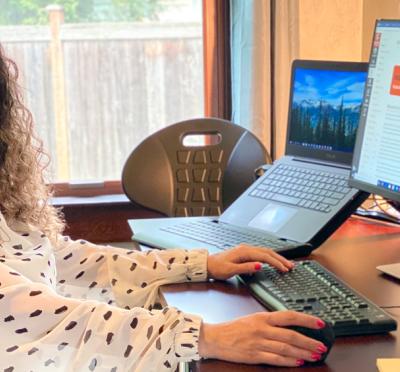
Chris Gomez, a nuclear medicine technologist at WellStar North Fulton Hospital, outside Atlanta, was on the verge of earning his master’s degree in radiation health physics online through Oregon State University’s Ecampus. But the COVID-19 public health emergency threatened to delay the completion of his degree. It also set his professional and private lives on a frightening collision course.
Gomez had been living in Savannah, Georgia, working and taking courses online. Last year, he returned to the Atlanta area for better career opportunities and to be close to his family. His younger sister, Kaylee, 23, has been undergoing treatment for brain cancer, including two surgeries and radiation therapy. She spent January and half of February in the hospital, and she’ll start chemotherapy at home next.
Gomez moved into his mother’s house in a north Atlanta suburb, where his parents have been caring for Kaylee. His plan was to help them look after his sister, then find a place of his own. The pandemic and shelter-in-place orders upended his plans.
Kaylee’s immune system has been compromised by treatment, leaving her highly susceptible to infection, so Gomez takes extreme precautions when he returns home from work. Before leaving the hospital, he texts ahead to make sure his sister will be in a safe place when he arrives. He goes straight to his room, sets his clothes aside, and showers immediately. He disinfects everything he touches, washes his hands religiously, and keeps his distance. The siblings communicate through closed doors or electronically.
“I used to leave work behind at the end of a shift. I’d do my job, go home, and that’s it. Now, I’m dealing with this at work and I’m dealing with it at home. I’m constantly on guard,” Gomez said. “It would be absolutely shattering if my family got sick.”
The tension is just as palpable at work.
“At the outset, we didn’t have a good grasp on what was happening with patients,” Gomez said. “Many were showing up with shortness of breath and other symptoms that could indicate pulmonary embolisms.” To rule out the dangerous condition, he regularly conducted a test called a lung VQ scan. But part of the test would put him at high risk of infection if a patient had COVID-19. And suspicions were growing that some of them did.
There was no way to be certain, though, because COVID-19 test results were taking weeks to come back. “For our protection, the radiologists put a halt to the scans. It was a scary situation,” said Gomez. Thankfully, he’s shown no signs of infection.
Recently, the hospital stopped all non-emergency outpatient procedures and imaging studies, which meant technologists like Gomez worked fewer hours. That, however, allowed them to be trained in some nursing roles in case of a surge in the number of COVID-19 patients, or if nurses started getting sick. “On some days, I’ll screen patients in the ER, and others I might help nurses on the floors check on their patients,” Gomez said. He also started working 12-hour shifts to synchronize with the 12-hour nursing rotations.
In the midst of this storm of uncertainty, Gomez learned that he might not receive his degree on time. The rules required graduate students to maintain active-student status when sitting for their exit interview. To meet this requirement, Gomez would have to take another course in the spring term. Given his grueling schedule, that was not an option. Besides, he’d already earned more than enough credit hours to fulfill his degree requirements.
After a flurry of emails with Oregon State, the Graduate School allowed Gomez to take a one-hour course with his advisor instead of a standard 3-hour course. He sat for his exit interview in late April, meaning he’s now completed all his degree conditions.
Gomez describes himself as a very private person. He doesn’t even have a Facebook account. It’s unlike him to reveal personal information in any public forum. But he agreed to be interviewed for this article, because he thought that speaking up might help others to put the situation into perspective.
“It’s a tough situation for me and my family, but I’m thankful that at least I have a job when so many people have lost theirs and so many are struggling,” Gomez said. “And yet I still know people who aren’t taking COVID-19 seriously and are just going about their lives as if everything is normal. It’s so wrong. It’s one thing if you’re not concerned about yourself, but it’s bigger than that. You’re affecting everybody around you — your loved ones, your friends, your classmates. I thought that by sharing my story, more people will think, ‘Hey, I shouldn’t be thinking about just myself right now, because my actions have consequences far beyond me.’ And I want to remind people that they’re not alone in this. Maybe sharing my story can help things for the better.”



